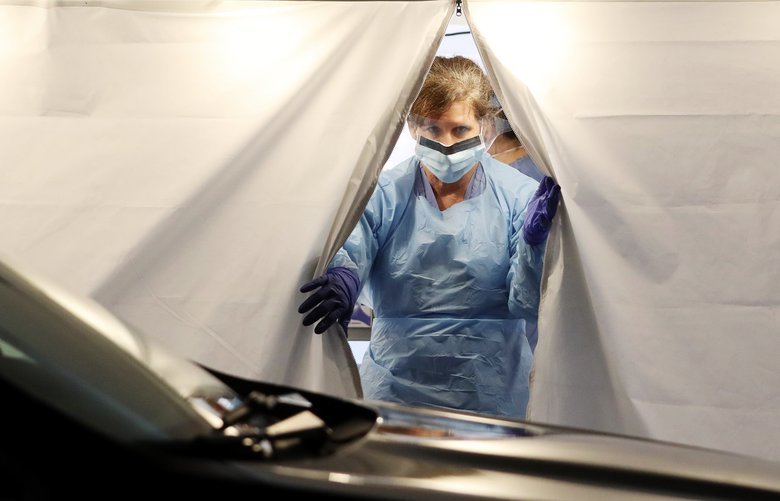[ad_1]
Washington’s state epidemiologist on Friday offered a stark assessment of a critical shortage of personal protective gear for health care workers and testing supplies needed to combat the coronavirus pandemic and safeguard workers.
“We have health care workers wearing bandannas at this point,” Dr. Scott Lindquist told The Seattle Times on Friday. “Our warehouse is empty. Literally, we don’t have any [equipment] to be given out. And when we do get it, we give it out right away.”
Washington, as one of the states worst hit by the coronavirus pandemic, has been able to tap into the National Strategic Stockpile, a U.S. Department of Health and Human Services program that holds medical supplies and pharmaceuticals to supplement local stocks during public health emergencies.
State officials report receiving two shipments of federal supplies. The first order had its last shipment arrive by March 6. The second order arrived last week.
The state made another order for supplies March 13 as the scope of the epidemic escalated greatly in the Puget Sound region. The last order was only approved Friday after a week’s delay, according to Casey Katims, Gov. Jay Inslee’s Director of Federal and Inter-State Affairs.
During this past week of shortages, members of the congressional delegation and state officials pressed for additional distribution.
“We are sending a very strong message every single day to the federal government. We are out of PPE [personal protective equipment]. We are out of lab equipment. We’re out of reagents [used for tests]. We need them to send it now,” Lindquist said Friday.
Inslee, in a news conference Friday, said the new supplies are expected to arrive during the next few days. They will include 1.6 million N95 respirator masks, 12 million disposable gloves, 560,000 surgical masks, 650,000 disposable gowns and 74,000 canisters of disinfectant wipes.
There also could be some help coming from the Energy Department, which operates the Hanford nuclear site in south-central Washington.
A spokesman for Sen. Maria Cantwell, D-Wash., said the Energy Department has sent a supply of Tyvek suits to the federal Centers for Disease Control and Prevention for distribution. They are currently working with local health organizations to see what other items are available, according to Ben Marvin-Vanderryn, a Cantwell spokesman.
The shortage of protective equipment for health care workers is escalating their risks of contracting COVID-19, the disease caused by the coronavirus, and depriving overstretched hospitals of their services at a time of great need. It is part of a nationwide dearth of respirator masks, gowns and other types of gear that earlier this week prompted a multitude of health care workers to take to social media — rallying with the Twitter hashtag #GetMePPE — to display the gear they were trying to get by with.
In Washington, there are more than 1,500 confirmed coronavirus cases and more than 80 deaths, as of Friday. Lindquist said that the statewide supply shortages are so severe that some “health systems are completely out of protective equipment,” and that some workers have taken to making cloth masks.
The protective equipment situation is dire at Seattle area hospitals, said Victory Lonnquist, a trained medic and community activist.
“It’s like the Wild West. It’s hard to believe that in a First World country, we’re facing this,” Lonnquist said.
At Harborview Medical Center in Seattle, a healthcare worker who cares for patients potentially exposed to the coronavirus said that the hospital has run out of masks with attached plastic eye shields once used as protection. So now, the staff are using a mask and a separate pair of plastic glasses, which at some point may need to be washed and reused.
“We are running very low on everything and trying to conserve. If not resupplied it is going to be really difficult,” said the worker, who spoke anonymously.
This week, Lonnquist launched the “Mask Drive – Help our first responders!” public Facebook group. The campaign calls on citizens to volunteer supplies or sewing skills to create makeshift masks based on designs recommended by the CDC.
For Washington, the shortages also have limited statewide efforts to expand testing for the coronavirus.
Lindquist, the state epidemiologist, said that workers who take the specimens from patients may not have the protective gear they need, or even the swabs needed to take a specimen. There also is a lack of transport media, or the solutions needed to cover the specimens so they remain viable during shipment. And at the laboratories, there isn’t enough of the reagents needed to process the tests.
“All these are creating bottlenecks to getting tested,” Lindquist said. At this point, he said, these are more serious problems than the overall capacity of laboratories to process the samples.
If the federal government wants everyone who needs a test to get one, then “send us the equipment,” Lindquist said.
Seattle Times reporter Evan Bush contributed to this report.
[ad_2]
Source link Google News


Leave a Reply